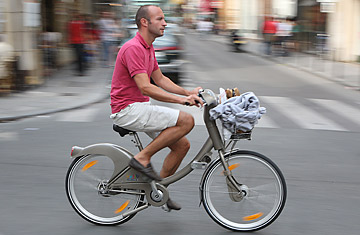
A man cycles on a Vélib' rental bicycle in central Paris
The 60-something woman moves swiftly down the Rue de Rivoli, gray hair pulled back, looking like an iconic grandmother or retired grade school teacher. But as she runs a red light and speeds into a crosswalk filled with people, the woman slaloms her large bicycle between startled pedestrians — barking at them to stand clear despite their having the right of way. "Dégagez!" She shouts the order to give way. "Why are people so stupid?" (See pictures of the U.S.'s National Bike Month.)
Welcome to the cruel downside of Vélib' — the enormously popular bike-rental scheme offering Parisians a cheap, environmentally friendly form of urban transportation. Since its introduction in July 2007, Paris' Vélib' program has facilitated 42 million rentals by 177,000 people with annual subscriptions to the system and countless others who have rented bikes on a one-off basis. The program allows riders to use credit cards or subscriptions to hop onto one of the program's 20,600 bikes from 1,451 stations around Paris and its nearby suburbs. And the ride is free if the large, gray Vélib' bike is returned within 30 minutes. The inexpensive and convenient service has been embraced by Parisians as well as visitors (who make up 33% of Vélib' renters) — and is overwhelmed whenever strikes bring Paris public transportation to a stop.
The problem comes when habitually snail-paced pedestrians find themselves aloft fast-moving bicycles, especially ones for whose upkeep they don't feel responsible. Recently released figures indicate that around 11,600 of the bicycles have been trashed, slashed, battered, brutalized and even drowned in the Seine since the program began; 7,800 others have been stolen. Just as bad, some cyclists have even begun broadcasting Internet videos of themselves engaged in "Vélib free rides" or "extreme Vélib'," in which wannabe urban daredevils put the solid but graceless bikes through punishing stunts usually reserved for BMX or mountain bikes.
"Unfortunately, that reflects the mind-set of a lot of Vélib' riders, who think riding someone else's property whenever the mood takes them means they can ignore the rules of the road and act like jerks," says Nathalie Dubois, a 45-year-old medical worker who has been riding her own bike in Paris for over a decade. "Nine times out of 10, when you see someone breaking road laws or just being obnoxious on a bike, they're on a Vélib'."
Indeed, it doesn't take a very long stroll around Paris before an observer will see cyclists like the older Rue de Rivoli bomber running red lights or racing through busy crosswalks in violation of codes. An astonishing number of bike riders also seem to think directional restrictions on one-way streets apply to cars alone. And pedestrians in Paris simply haven't lived until a cyclist tartly demands that they cede passage on sidewalks that bicycles have no right to be on in the first place.
While the proliferation of bicycles in Paris has created a new form of pushy and irresponsible behavior rivaling that of the city's motorists, it may not, in fact, be true that the worst two-wheeled offenders are usually Vélib' renters — despite the statistics that suggest as much. The number of Paris accidents involving cyclists has exploded 37.2% since the scheme was introduced, surging from 506 crashes in 2006 to nearly 700 in 2007 (including three Vélib' rider deaths that year; there were four in 2008). However, that surging accident rate is largely accounted for by the more than 70% increase in cycle traffic since the Vélib' launch.
Accusations and countercharges over whether the Vélib' program has imperiled safety will probably continue for some time, especially since the criticism of Vélib' riders is partially based on the in-crowd snobbery of private-bike owners. Still, even Vélib' adepts admit they've earned some of their bad reputation.
"You use a Vélib' either for fun or to get somewhere fast, so you're not thinking too much about rules, which most of us don't know anyway," says a Vélib' cyclist who gives his name only as Lolo after being stopped by a pedestrian for riding on the sidewalk — and in the wrong direction — on the one-way Rue des Archives in central Paris.
"I know I'm not supposed to do this, but it's no big deal, is it?" asks Lolo, smiling. Maybe not, but attitudes regarding biking manners do seem to vary greatly depending on which side of the handlebars one is on.
